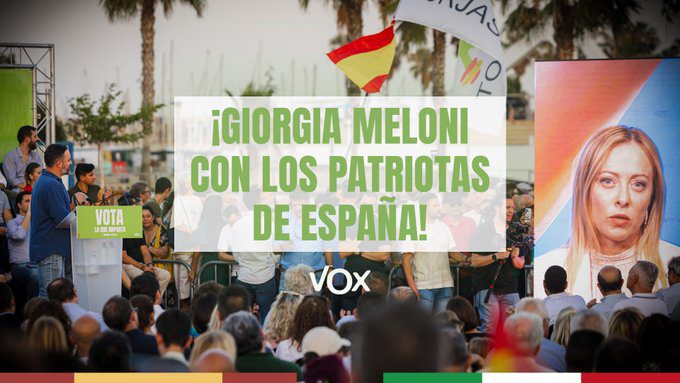
“Giogia Meloni, with the Patriots of Spain!” Italy’s Prime Minister Giogia Meloni made a televised appearance at a VOX rally in Valencia, Spain.
VOX, on Twitter
During a campaign event in Valencia recently, VOX party leader Abascal gave the floor to Italian President of the Council of Ministers, Giorgia Meloni, who spoke by video-call to the assembled crowd.
Thank you very much, Santiago … I am very sorry not to be able to be there with you in person, but I am very happy to be able to contribute with my message to the VOX election campaign again demonstrat[ing] our friendship … Ten days remain before a decisive date for the future of your country’s history, ten days for the patriots to enter the government in Spain.
She emphasised the disadvantage at which a party like VOX finds itself:
I am following your election campaign … with so many squares like this one, always full of enthusiasm, warmth, love of country. I also know that you are running a difficult campaign, one that, in many ways, is poisoned by those who believe they can defeat you through demonization or exclusion from debates. I have been through that, but I can say that in the end citizens always turn out to be smarter than some people think and do not let themselves be influenced. During our election campaign in Italy, the Left, and the mainstream media tried to scare voters.
Contrasting with the apocalyptic scenario of a Fratelli victory painted by the media, Meloni went on to list her government’s successes, without forgetting ongoing challenges which VOX could help tackle if it entered government, namely that of migration:
We are facing very strong migratory pressure, and we are committed to achieving a stable and lasting solution. It will take more time, but I am sure that ours is the right recipe. Thanks to the work of the Italian government, the European Union now considers it a priority to address the issue of migration before it reaches Europe.
In this context, Meloni referred to her long-term plan to develop Africa in ways that stem the northward flow of persons (see the Mattei Plan), while benefiting Europe, and especially southern Europe, through transit revenue for energy and cheaper gas:
This new attention from the EU on external relations will be of particular interest to first-arrival countries, such as Spain and Italy. We are working on a new strategic partnership with African countries that will also be crucial to stop human traffickers and put an end once and for all to illegal immigration flows. We must make it clear that if we are willing to give refuge to those who are indeed fleeing a conflict, we cannot think of taking in all the economic migrants who arrive illegally on our shores and who must therefore be turned away. It is essential for Europe to deal with the big issues: strategic autonomy, the competitiveness of the internal market, security, and border defence in close collaboration with national governments.
Finally, Meloni finished her speech by asking voters not to be afraid of putting their confidence in an emergent party like VOX:
Do not be afraid to vote according to your conscience, reasoning with your head. Each of us are history and each of us can change it. We count on you. Long live Spain, long live Italy, long live the Patriots, the European Patriots.
What was most interesting about this campaign event was the (still frustratingly underdeveloped) idea of a pan-European, geopolitically sensical diplomatic architecture for the continent’s relations with Africa, geared towards stopping migration and generating employment in Europe’s southern neighbours.
These sorts of projects, which require state companies or joint, private-public, initiatives, have not received particular attention in VOX’s economic proposals, but are necessary if the Mediterranean is to stabilise and Spanish national interests are to be harmonised with its European sister nations (especially Italy with respect to North Africa).
Even if VOX does enter into government after the upcoming elections, however, it remains to be seen how much of a voice it will have in a coalition with the centre-right PP.
